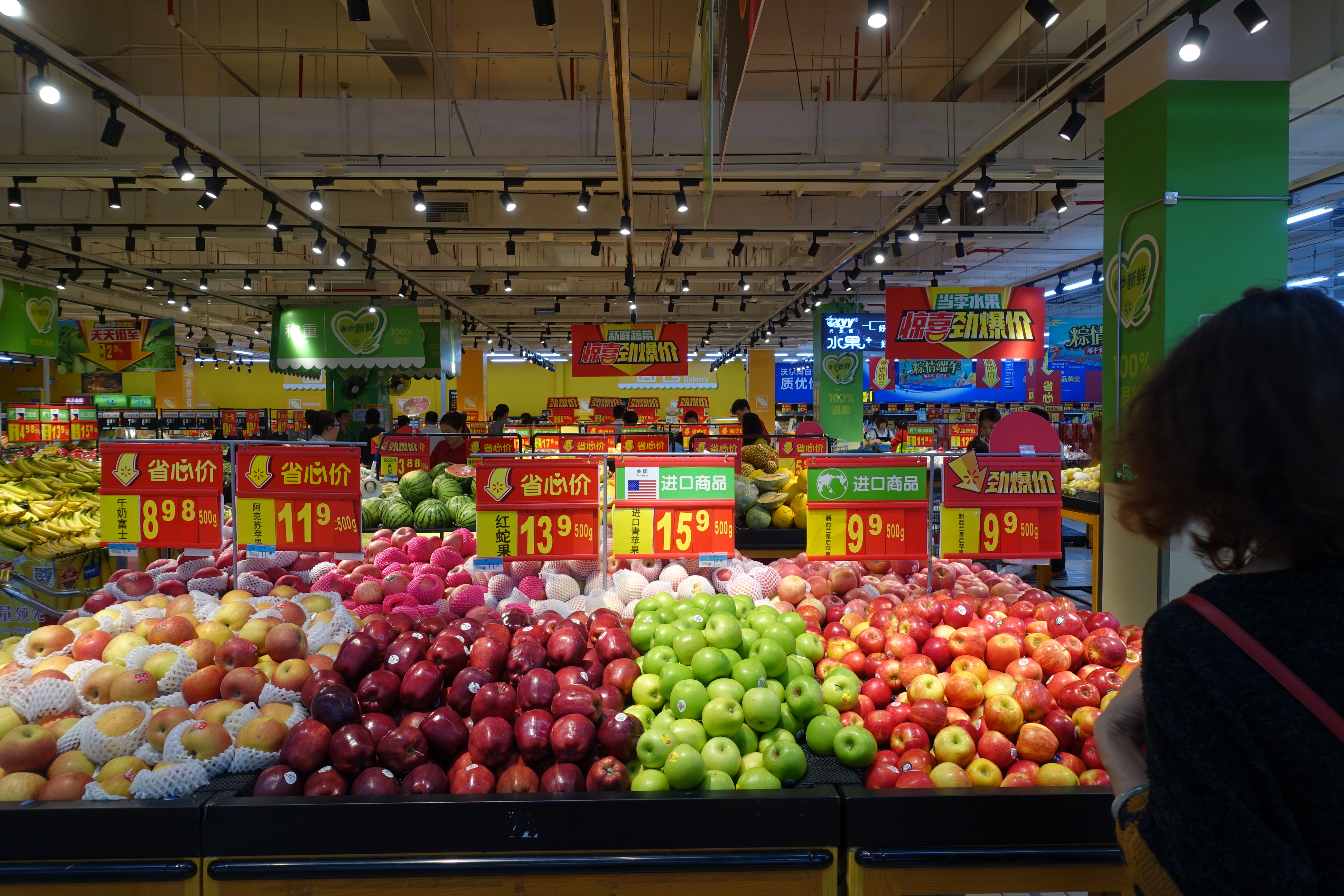
Members-only retailers are a status symbol in China

Sam’s Club in Shanghai is surprisingly busy on a Monday morning with its steady stream of customers.
At one point, I had to turn the shopping cart without hitting five others, all headed in various directions in the spice aisle.
This was my first time shopping at a Sam’s Club. Since I cannot step in without a membership, I have brought my good friend Daisy Guo, who has been a Sam’s Club member since last year.
“The first I heard about [Sam’s Club’s model was] really weird. Why should I buy the membership to buy something?” Guo said. “But [I heard] it has really cheap and fancy foods. I was kind of interested to look into that.”
Sam’s Club entered China in 1996. But its members-only model caught on in a big way during the pandemic, when people were frequently trapped in sudden lockdowns. Since 2020, Sam’s Club has gone from 26 to 45 stores in over two dozen Chinese cities.
During that same period Sam’s Club’s parent company Walmart has closed 90 of its retail stores across China. French retailer Carrefour, which sold 80% of its China operations to Chinese retailer Suning in 2019, has closed at least 160 stores since last year. At present count, Chinese supermarket chain Yonghui has shut at least some 437 shops since its peak in 2019. Grocery sales are down 0.5% in the first eight months of this year.
Guo renews her Sam’s Club membership, which costs 260 yuan ($36) for a basic tier. This is lower than the $50 the membership retailer charges in the U.S. Still, $36 is a bit expensive for Guo, so she will split that membership cost with a friend.

Guo lives alone with her dog but she still enjoys shopping at wholesale retailers because she said there are many items she can not easily find elsewhere in Shanghai.
“If the bulk item is too big, I will take a picture and send it into my [WeChat] friend groups and ask if anyone wants to split with me,” Guo said. “That is how single people like me can still shop at Sam’s Club.”
As we go through two floors of Sam’s Club in Shanghai’s new Pudong district, Guo said she has not been back in a while and marvels at the selection of Southeast Asian food.
“Wow I need this!” Guo said while grabbing a big bottle of Thai chili sauce. It takes a while for Guo to tear herself away from the instant noodle aisle, which stocked Vietnamese beef noodle flavor and a notoriously stinky snail rice noodle called luosifen. She also lingers at the gift cards for boxes of hairy crab — a seasonal treat from eastern China.
As we ride the shopping cart conveyor belt to the fresh food floor, Guo rattles off all the items Sam’s Club is known for: imported beef from the U.S. and Australia, fresh salads, sushi and its baked goods.

She is also up to date on the hot ticket items like Korean chewy bread made out of sticky rice, mashu, and Swiss rolls, thanks to Chinese social media platforms like photo-rich Xiaohongshu, or Little Red Book. That is where many Chinese customers find out what places like Sam’s Club are selling.
“Every time Sam’s Club comes up with a new product Xiaohongshu [influencers] will test [and review] it,” Guo said.
Those reviews are important because the whole shopping experience at membership clubs is so new to the Chinese. In a country of over 1 billion people, there are only four Costcos, 45 Sam’s Clubs, 10 Freshippo X from the tech giant Alibaba group, and 24 Metro membership stores, which is a German-Chinese joint venture.

Most families in China buy food almost daily at meat and vegetable markets, where shoppers can buy as much or as little as they want.
Whereas in Sam’s Club, most food, including fresh meat and seafood, are pre-packaged for convenience. That explanation, along with answers to other frequently asked questions are plastered on the wall at the Sam’s Club store in English and Chinese.
A price war recently broke out between Sam’s Club and Freshippo X and it was documented on Chinese social media. Sam’s Club had a durian-flavored crepe cake for 128 yuan ($18). Then Freshippo X sold its own durian cake cheaper at 99 yuan. Sam’s Club discounted its cake by a smidge to 98.9 yuan. Hema countered with 89 yuan. On that Monday, Sam’s Club’s durian cake was 85 yuan ($12) and members were limited to one each.


“When the gods fight, ordinary people benefit,” TikTok’s Chinese sister site, Douyin, user Chigua Xuemei said in a video on the durian cake price war.
Sam’s Club and others are targeting China’s aspirational consumers in its middle class. Not only is membership required, but shoppers also need a car to haul the bulked goods home. Owning a car in Shanghai is pricey. While the majority of Americans have a car, in China there is one car for every 4.5 persons, according to government statistics.
Lastly, shoppers at members-only wholesale retailers need a big enough home to store all the food. Guo’s apartment is 650 square feet, which in Shanghai fits a family of two or three.
There is a huge range of income levels within China’s middle class.
“A Sam’s Club opened about a year ago in my neighborhood just like two miles away,” Charles Zhang, Marketplace’s news assistant, said.

To entice people in his middle-class area, Sam’s Club was offering a bag of rice or cooking oil as a bonus gift just to sign up. Zhang was not sold, but it became a bragging point for his neighbors who did sign up— a status symbol.
“One night after supper, my mom was sitting outside to take a rest and then [an elderly] neighbor greeted her. Suddenly out of nowhere she said, ‘Did you go to the Sam’s Club?’” he said. “That question to my mom is to show ‘I have a membership. You don’t and I want to remind you of that.’”
Sam’s Club also provides little extras while shopping there. One staff member is stationed at the entrance to each floor to help shoppers pull their shopping carts safely off the conveyor belt. Another staff member saw our shopping cart had a box of fresh clams and she brought a bag of ice to keep it cold.
“That is so sweet,” Guo said.


As Guo and I, with Zhang in tow, finish shopping, we sort our cart. An elderly woman walks over with hands behind her back peering over our shoulders.
“I’m just looking to see what products there are to use as reference,” she said.
Presumably she does not read reviews on Chinese social media.
We choose a checkout line with only one customer ahead. We wait over five minutes because she had two carts full of mostly meat. Sam’s Club is known for its higher quality beef in China, and it isn’t cheap. Her total bill came to 8,900 yuan ($1,200).
The checkout staff said she has seen people easily spend over $2,000, especially over the holidays.
By comparison Guo was restrained and spent about $50.
Later, Guo said her nosy neighbor gave her shopping the once over and told her: “Ohhhh you’ve bought a lot from Sam’s Club.”
Additional research by Charles Zhang
There’s a lot happening in the world. Through it all, Marketplace is here for you.
You rely on Marketplace to break down the world’s events and tell you how it affects you in a fact-based, approachable way. We rely on your financial support to keep making that possible.
Your donation today powers the independent journalism that you rely on. For just $5/month, you can help sustain Marketplace so we can keep reporting on the things that matter to you.

















